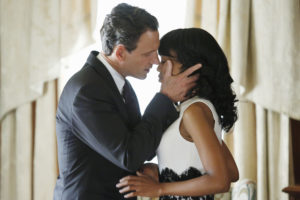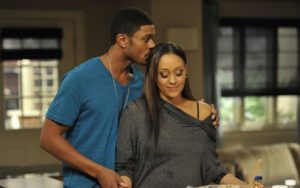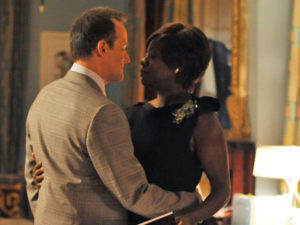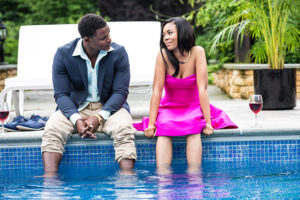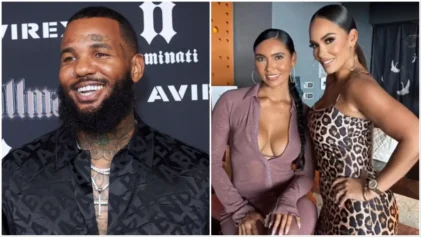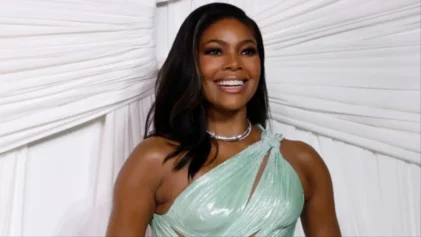Recent conversations about the TV landscape are applauding the industry for finally welcoming more Black faces in prime-time television, but the mere presence of more Black faces is not the key to adding more diversity in mainstream media. Just as Black casts become more diverse, Black stories must diversify as well.
Despite a whitewashed Oscars ceremony, many have argued that the future looks promising for Black talent and Black stories in mainstream media.
To be clear, the progress Hollywood has made in creating more diverse casts is still not nearly enough to provide a fair representation of Black voices in films and on television. It is merely a sign of progress and a slight nod that perhaps someone, anyone, is listening to the massive numbers of Black viewers who want to see their own lives reflected in the media they consume.
But even as more Black faces start to appear in prime-time television and movies with predominantly Black casts continue to become box office hits, Black love stories are still extremely rare in mainstream media, especially on television.
In the world of problem-solving Olivia Popes and soul-searching news-anchoring Mary Janes, Black men and Black women just can’t seem to love one another.
Two of today’s top-rated shows with Black leading ladies, How to Get Away With Murder and Scandal, feature the strong Black female characters in relationships with white men.
BET’s Being Mary Jane follows Gabrielle Union’s character as she embarks on a quest to find love, but still remains largely focused on her inability to do so.
The Game, which features a Black ensemble cast engulfed in the dramas that come with love, money and fame, has been a rare exception to the rule, although the show’s ratings have been unsteady and have tapered off significantly since the show’s first season.
ABC’s Black-ish brings a happily married Black couple, portrayed by Tracee Ellis Ross and Anthony Anderson, to the forefront, but it is also a sitcom focused on family as opposed to a true love story.
The dearth of true Black love stories is a problem that has persisted despite decades of both Black stars and Black consumers voicing their frustrations with Hollywood’s refusal to present a dynamic love story between a Black woman and a Black man.
Denene Millner, a New York Times best-selling author and one of the brilliant women behind the novel that inspired the Lifetime film With This Ring, recalled being a part of the conversation years ago when ER’s Eriq La Salle openly discussed his frustrations with writers giving him a white love interest rather than a Black one.
“He was upset that they had written a love interest for him and made his love interest white,” Millner recalled. “He was insistent that it was unfair that he couldn’t, on this television show, love a Black woman.”
At the time, the typical demographics for Black characters in TV relationships paired a Black man with a white woman while Black women remained largely unloved and uninvolved in mainstream media’s tales of romance.
“Black women never had love interests,” Millner added. “They were the best friend, the straight-talking girlfriend who got her white friends together. She was the super-smart person, the judge.”
On television, a Black woman was more likely to be many things before she was likely to be “desirable.”
As the media landscape evolved over the next 20 years, many things would change.
More Black talent would be creating content as well as acting in it. Strong Black women would finally be given love interests. Black characters were finally taking on lead roles. Still, however, the Black love story seems to be tucked away in the shadows.
Millner added that while How to Get Away With Murder’s Professor Annalise Keating, played by Viola Davis, has an intimate relationship with detective Nate Lahey, played by Billy Brown, he is still a “side piece” while Keating’s husband is white.
“I want to see two Black people on television loving one another, going through the drama of falling in love, figuring out how to negotiate love and going through some things and figuring out how to make it work again,” she added. “That just does not exist.”
That unquenched thirst in the Black community is a part of the reason With This Ring was able to quickly soar to the top of TV ratings when it aired on Lifetime, earning the title of the highest-rated cable program of the night.
“[With This Ring] was just a really great movie overall,” said Alisica Ray, a 22-year-old avid Scandal watcher who has also been troubled by the lack of Black love on television. “I think the fact that it was a love story with all these Black people just made it even better. I don’t think we get to see that a lot.”
Ray pointed out that she personally has no problem with Scandal’s Olivia Pope falling in love with a white man but instead insisted that it’s the “lack of the other” that makes a lot of viewers weary of the relationship.
“I don’t think the interracial relationships are the real problem,” she said. “It’s the lack of the other, the lack of the Black couple also. I shouldn’t be struggling to even think of a prominent Black couple on TV right now that isn’t trying to kill each other or sabotage each other or just being nasty to each other.”
She pointed out that it’s an inevitable problem, however, when “people only allow Black people on TV to be a certain thing.”
In Hollywood, where money has long reigned as the ultimate decision maker, this insatiable thirst for Black love stories may not seem quite as glaringly obvious as it is to the consumers who tune in every night hoping to see a couple on television who’s a little more representative of the interactions in their community.
As Millner explained, Black voices urging for a love story is one thing, getting Black viewers to actually support a Black love story is a completely different feat.
Black love stories have fared better in the world of film but even then the outpouring of support tended to happen after the film was already pushed out to DVDs, not while the Black love stories were being tested in the theaters.
“I think what fails to be mentioned here is that when Love Jones, The Best Man and Love and Basketball were in the movies in the ’90s, nobody went to see them,” Millner said. “Black folks did not support those movies. They’re legendary now and they’ve made huge strides in the DVD and video circuit, but when they were in the movies they were considered failures. … We didn’t go to support them.”
That has left many Hollywood executives feeling hesitant about just how successful a Black love story could really be on any platform in mainstream media when success is counted by viewers and ratings rather than think pieces and hashtags.
Millner urges creatives in Hollywood to focus on crafting a genuine love story that is appropriate for today’s generation of viewers as they try to crack the code to getting the Black love story in mainstream media.
With many Black women getting married later in life, it isn’t likely that wedding films could have a substantial amount of success with the coveted millennial viewers who haven’t even started thinking about marriage just yet.
But just because viewers aren’t necessarily craving to see church pews and white gowns as the center of their love stories doesn’t mean the Black youth aren’t hopeful that Black love will make a major TV debut.
“When you look at the things we digest and take in, you know, the things we consume, it’s very often a story of lust,” Ray added. “… I don’t think we really want that. I think we’re afraid to say we want to see [love]. I think younger people, coming from these different circumstances, I think we’re a little more afraid of a real love story and we don’t even really understand it. That doesn’t mean we don’t want it or want to see it but it just has to actually feel real to us … it has to be this nontraditional, emotional, nail-biting love story that just so happens to be between a Black man and a Black woman. We need to see that.”
So with the vast majority of Black men of all ages dating and marrying Black women, which was confirmed in a study conducted by Howard and Morehouse researchers, Black love is not by any means a mythical creature — seeing Black love on TV is.
